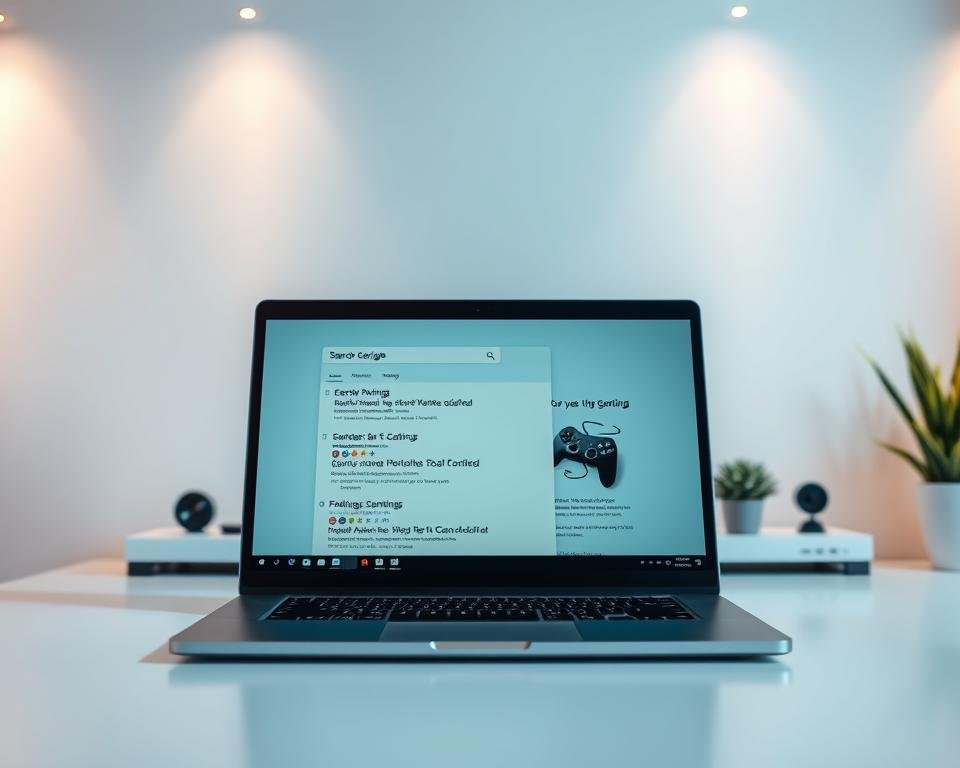As a gaming blogger, I’ve often wondered how some blogs manage to rank high in Google search results while others remain buried. The competition is fierce, but with the right strategies, you can increase your blog’s visibility and drive more traffic to your site.
With the ever-growing number of gaming blogs, it’s essential to optimize your site for search engines. I’ll share my insights on gaming blog SEO and walk you through the essential steps to improve your Google ranking.
Key Takeaways
- Optimize your gaming blog for search engines to increase visibility.
- Use relevant keywords to improve your Google ranking.
- Create high-quality, engaging content for your readers.
- Utilize internal and external linking to enhance your site’s credibility.
- Regularly update your content to keep your audience engaged.
Understand the Gaming Niche and Audience
Knowing your audience and the gaming niche is key for a blog’s success. It’s important to understand what your audience likes and what they’re searching for. This helps you create content they’ll find interesting.
Analyze Popular Gaming Topics
Looking at what’s trending in gaming is a must. This means checking out new game releases and updates. It also means seeing what people talk about online.
By focusing on these topics, you make your content more relevant. Popular topics include walkthroughs, reviews, news, and analysis. This gives you many chances to create engaging content.
Identify Your Target Audience
Figuring out who your readers are is important. You need to know what they like and what they expect from you. This helps you create content that they’ll enjoy.
Knowing your audience lets you tailor your content. You can focus on certain types of games or content that they like. This makes your content more engaging and builds loyalty.
Explore Competitor Blogs
Looking at what other blogs do is helpful. It shows you what’s missing in the market and how you can stand out. This means checking out their content, how they interact with readers, and their SEO strategies.
Learning from your competitors can help you improve your own strategy. This way, you can rank higher in Google search results.
Keyword Research for Gaming Content
To make your gaming blog better for search engines, start by finding the right keywords. Good keyword research is key to a strong SEO plan. It helps you know what people are looking for and make your content fit their needs.
Use Keyword Research Tools
First, use keyword research tools to find good keywords and phrases. Tools like Ahrefs, SEMrush, and Google Keyword Planner show you what’s popular in gaming. They help you see how often people search for things, how competitive they are, and what you might need to pay for ads.
Here’s how you can use these tools well:
| Keyword | Search Volume | Competition |
|---|---|---|
| Gaming PC Reviews | 2,900 | High |
| Best Gaming Headsets | 1,300 | Medium |
| Fortnite Strategies | 820 | Low |
Long-Tail Keywords and Gaming
Using long-tail keywords can really help your blog show up more. These are more specific phrases with less competition. So, instead of just “gaming laptops,” aim for “best gaming laptops under $1000.”
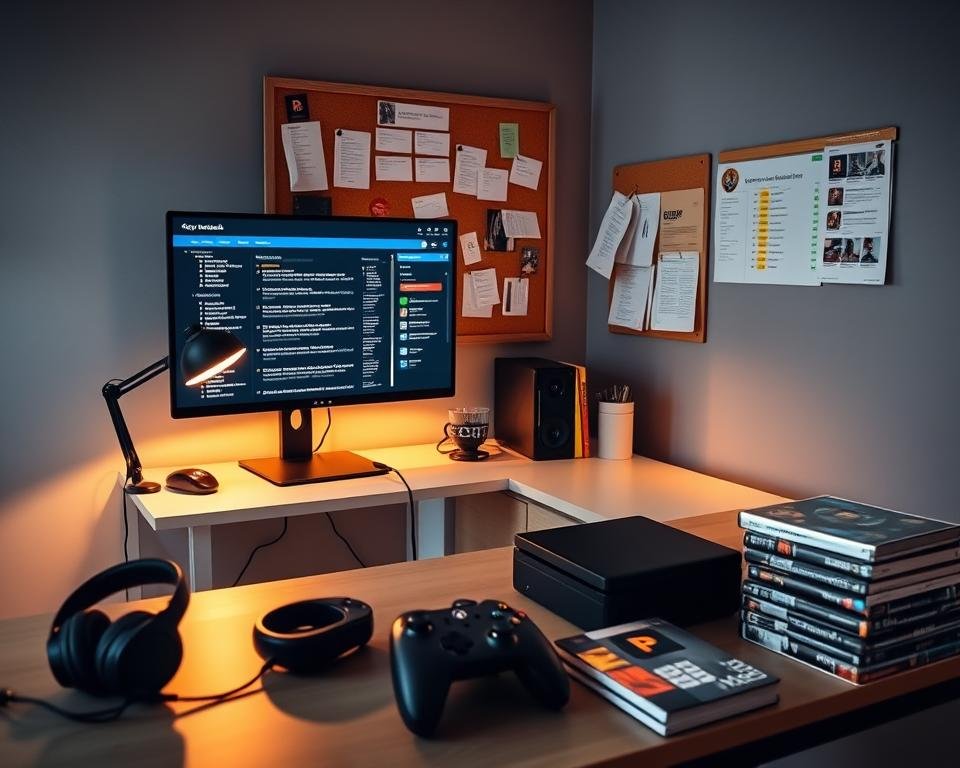
Optimize for Search Intent
It’s important to know what people are searching for. Are they looking for reviews, tutorials, or news? By making your content match what they’re looking for, you can make your blog more relevant and trusted in the gaming world.
For example, if someone searches for “how to improve gaming performance on PC,” they want tutorials or guides. Making content that meets this need can help you rank higher and get more people visiting your blog.
Create Quality Content for Gamers
In the world of gaming blogs, you must stand out. This means creating content that gamers love. It’s key to know what gamers want from a blog.
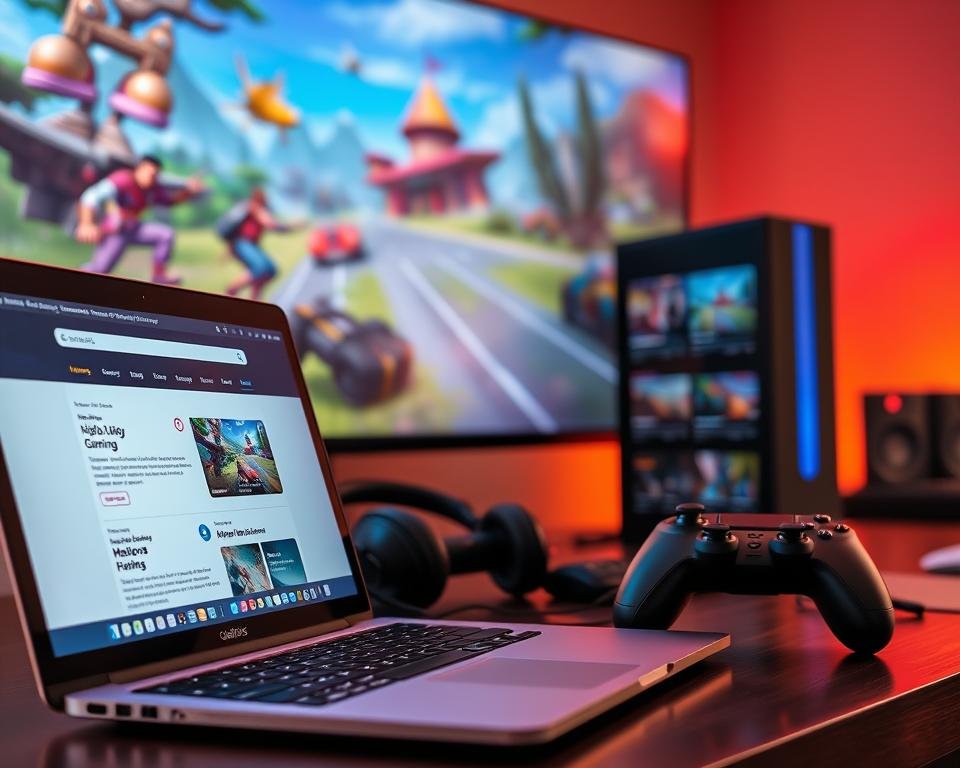
Focus on Unique Insights
Offering unique views on gaming topics can make your blog special. You might analyze game mechanics, character growth, or gaming’s cultural impact.
To make your content exciting, find what’s missing in other blogs. Then, share your fresh ideas. This draws in new readers and keeps old ones coming back.
Incorporate Reviews and Tutorials
Adding reviews and tutorials to your blog is very valuable. Reviews help gamers choose new games wisely. Tutorials teach them how to get better at games.
With detailed reviews and tutorials, your site becomes more interesting. This lowers bounce rates and boosts your blog’s SEO.
Engage with Game-related News
Keeping up with the latest gaming news is vital. This means covering new game releases, updates, patches, and esports events.
By staying current with gaming news, you attract readers seeking the latest info. Your blog becomes a trusted source for gaming news and updates.
Optimize On-Page SEO Elements
Improving your gaming blog’s search engine ranking is key. Focus on title tags, meta descriptions, header tags, and image optimization. These areas can greatly boost your blog’s performance.
Title Tags and Meta Descriptions
Title tags and meta descriptions are vital for SEO. Title tags should be clear, short, and include key words. They help search engines grasp your page’s content. Meta descriptions should draw users to click on your page from search results.
To make title tags and meta descriptions better, remember:
- Make each one unique
- Include the right keywords
- Keep them short and within limits
- Make them interesting to get more clicks
Header Tags Best Practices
Header tags (H1, H2, H3, etc.) are key for organizing your content. Using header tags correctly can make your content easier to read and improve SEO. Here’s how to do it right:
- Use H1 tags for your main title
- Use H2 and H3 tags for subheadings
- Put target keywords in header tags when it makes sense
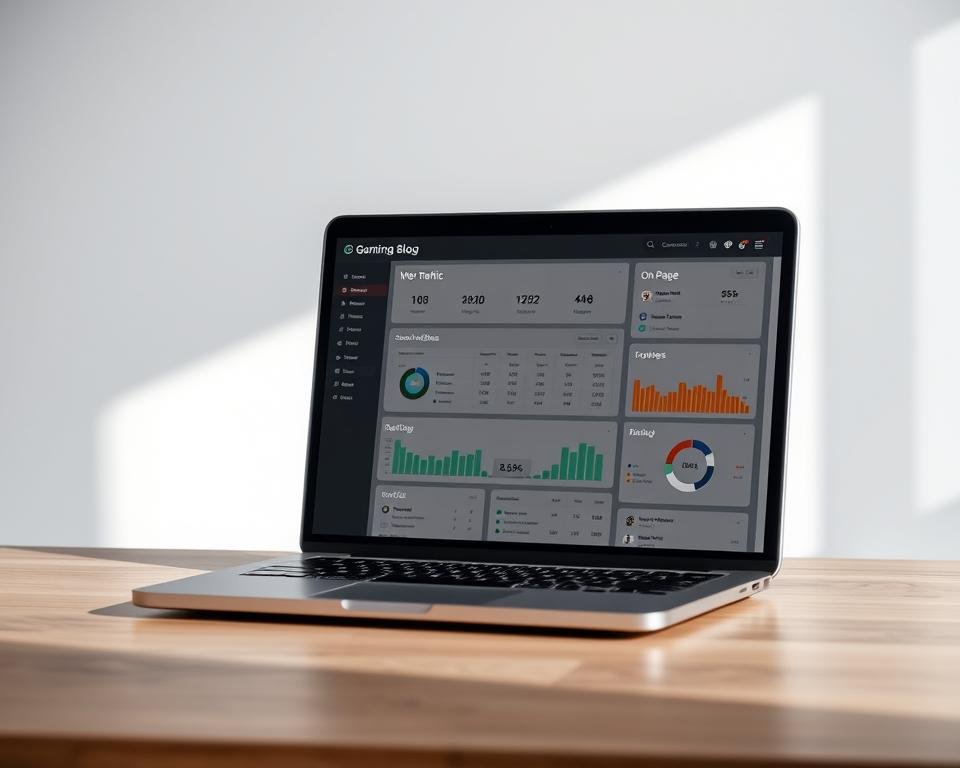
Image Alt Text and File Names
Don’t forget about image optimization. Good alt text and file names can boost your image search rankings. Here’s how to optimize images:
- Use file names that describe the image and include keywords
- Write alt text that accurately describes the image
- Keep alt text short and include relevant keywords
By following these on-page SEO tips, you can make your gaming blog more visible. This will help drive more traffic and improve your search engine rankings.
Improve Blog Loading Speed
Making your gaming blog load faster is key for better user experience and SEO. A slow blog can cause people to leave quickly. This can hurt your ranking on search engines.
Optimize Images and Media
Images and media often slow down blogs. To fix this, you can:
- Compress images with tools like TinyPNG or ImageOptim
- Use lazy loading for images
- Choose next-gen formats like WebP for images
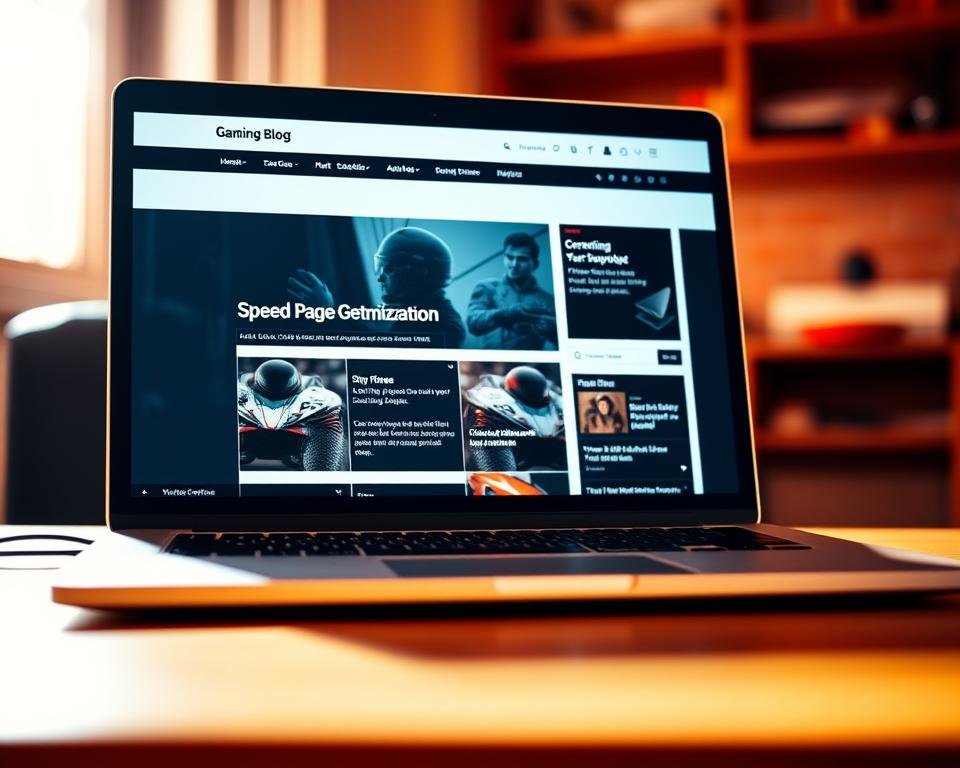
Minimize HTTP Requests
Reducing HTTP requests also helps your blog load faster. You can do this by:
- Using fewer plugins and scripts
- Setting up a content delivery network (CDN)
- Compressing CSS, JavaScript, and HTML files
Less HTTP requests mean faster loading times and better user experience.
Utilize Caching Solutions
Caching solutions are great for speeding up your blog. You can use:
- Browser caching for quick access to resources
- Server-side caching to ease server load
- Plugins like WP Rocket or W3 Total Cache for easy caching
Caching can make your blog load much faster and save your server.
Mobile Optimization for Gaming Blogs
The world is moving to mobile, and so should your blog. As a gaming blogger, making your site easy to use on all devices is key. This helps you reach and keep more readers.
Responsive Design Principles
Start with responsive design principles for mobile optimization. This means your blog should change size and look good on any screen. It should work well on desktops, tablets, and phones.
Use flexible grids and media queries to make this happen. Flexible grids let your content adjust to screen sizes. Media queries let you change styles based on screen width.
Test Mobile Usability
After designing for mobile, test how well your blog works on phones. Check if users can easily move around, read, and interact with your blog.
Google’s Mobile-Friendly Test can help spot problems. Also, test your blog on various phones to ensure a smooth experience. Look at loading speed, button clicks, and text clarity.
Focus on Fast Navigation
Fast navigation is vital for a good mobile experience. Make sure your blog’s main features are easy to find on phones. Use simple menus and mobile-friendly designs.
Also, make your content load fast on phones. Use less heavy scripts, optimize images, and use browser caching. A fast blog is better for users and search engines, following Google search ranking tips.
Mobile optimization boosts user experience and search rankings. It’s key for optimizing your gaming blog for SEO. Search engines prefer sites that work well on mobile.
Leverage Social Media for Traffic
To make your gaming blog more visible, using social media is key. Social media has a huge audience and tools to help you share your content. This can help you connect with readers and bring more traffic to your blog.
Creating Engaging Gaming Content
To do well on social media, your content must speak to your audience. Share parts of your blog posts, sneak peeks, and eye-catching visuals. Use catchy headlines and hashtags to make your posts easier to find.
For example, when you post a new game review, share a key quote or finding on social media. This can grab the attention of people who might be interested in reading your review.
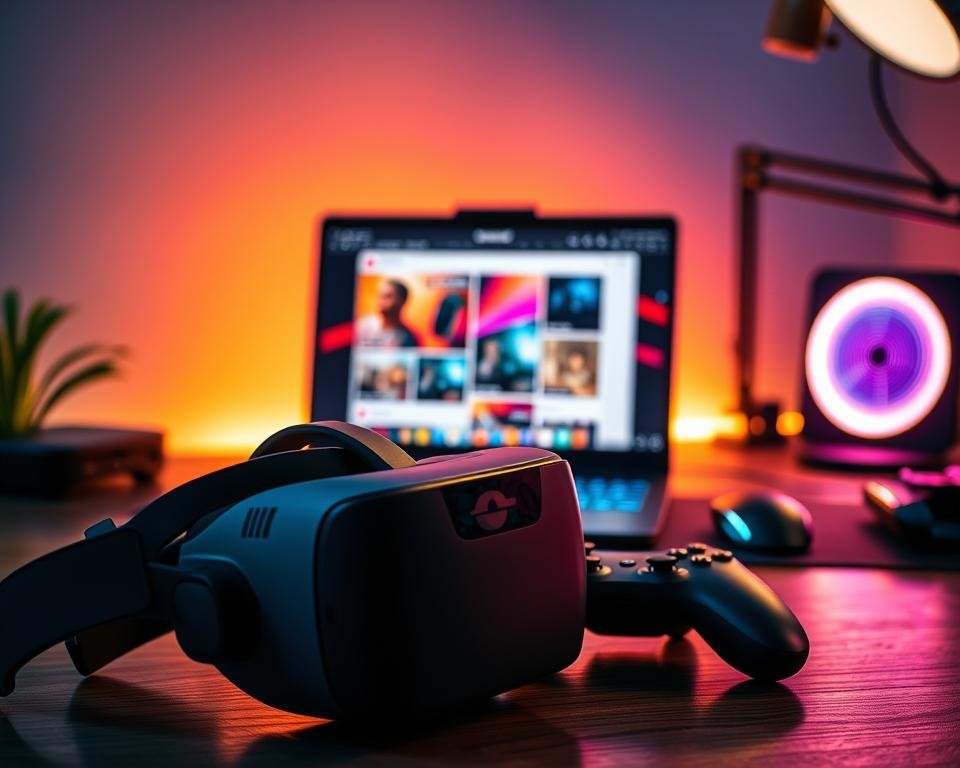
Utilizing Video Game Platforms
Video game sites like YouTube, Twitch, and forums are great for promoting your blog. Share your videos, go live, and join discussions. This can help you build your reputation and bring more visitors to your blog.
Here’s a look at some popular video game platforms and how they can help promote your blog:
| Platform | Audience | Content Type |
|---|---|---|
| YouTube | Large, diverse audience | Video reviews, tutorials, walkthroughs |
| Twitch | Gamers, streamers, and live audiences | Live gaming, interactive content |
| Gaming Forums | Engaged gamers, enthusiasts | Text-based discussions, reviews, guides |
Collaborating with Influencers
Working with influencers in gaming can really help your blog grow. Find influencers who match your blog’s style and do collaborations. This could be guest posts, joint social media posts, or hosting contests together.
By using social media well, you can make your blog more visible. This can bring more visitors and help you build a dedicated following.
Build Quality Backlinks
To make your gaming blog better, get quality backlinks from good sources. Backlinks help your blog show up more in search results. They also bring more visitors to your site.
Guest Posting Opportunities
Guest posting on other gaming blogs is a great way to get backlinks. Look for blogs that match your niche and audience. Make sure your content is high-quality, engaging, and relevant to their readers.
To start guest posting, find blogs that fit your style. Use tools like Ahrefs or SEMrush to find places to guest post. Always include a link to your blog in your author bio or content, if it’s okay.
Collaborate with Other Bloggers
Working with other gaming bloggers can help you get good backlinks. You can work on projects together, host giveaways, or be on podcasts. These partnerships can bring more links and readers.
When you team up, aim to build real connections. Engage with their posts, share them, and add value to their audience. This can lead to mutually beneficial backlink opportunities and make your blog more credible.
Use Forums and Online Communities
Being active in gaming forums and communities can help you get links. Share your knowledge, offer helpful insights, and talk with others. Many forums let you link to your blog in your signature or profile.
When you’re in forums and communities, always follow the rules and don’t spam links. Focus on sharing valuable content and building relationships with others. This can get you natural backlinks and improve your blog’s image.
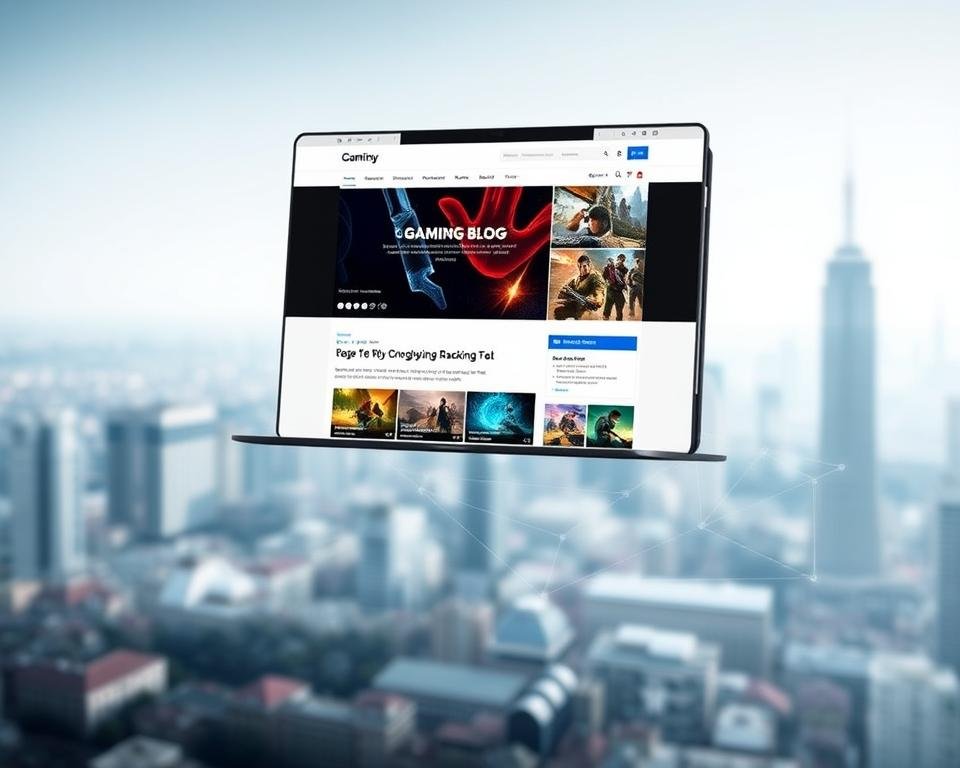
By using these methods, you can make your gaming blog’s backlink profile better. Focus on quality and keep your link building natural.
Use Structured Data Markup
Adding structured data markup to your gaming blog can give you an edge in search results. It helps search engines understand your content better. This makes it easier for them to index and show your pages in search results.
As a gaming blogger, using structured data markup can make your site more visible. It drives more traffic to your site. It gives search engines extra context about your content, like reviews and ratings.
Implement Schema for Gaming Content
To add structured data markup, use schema.org vocabulary. For gaming content, use schemas like Game, Review, and Rating. These schemas provide detailed info about games, reviews, and ratings.
- Use the Game schema to describe games, including their title, description, and platform.
- Use the Review schema to provide detailed reviews of games, including ratings and summaries.
- Use the Rating schema to specify ratings for games, including the rating value and scale.

Boost Visibility in Search Results
Schema markup can make your gaming blog more visible in search results. This can lead to better search engine results pages (SERPs). Your content can stand out with rich snippets and other features.
| Schema Type | Description | Benefits |
|---|---|---|
| Game | Describes a game, including its title, description, and platform. | Improves game discovery, enhances search results. |
| Review | Provides a detailed review of a game, including ratings and summaries. | Enhances credibility, improves search engine rankings. |
| Rating | Specifies a rating for a game, including the rating value and scale. | Provides users with quick insights, enhances search results. |
Enhance Featured Snippets
Structured data markup can also help your blog get featured in Google’s featured snippets. Clear, structured data increases your chances of being selected for these top spots.
To get the most out of it, make sure your schema markup is accurate and up-to-date. Follow schema.org guidelines. Test and validate your markup regularly to ensure it works as expected.
Promote Gaming Content Through Email
Building a strong email list is key for promoting your gaming content. It helps increase your blog’s visibility. By using email marketing, you can get more people to visit your site. You can also connect better with your audience.
Build an Email Subscriber List
To promote your gaming content via email, you first need a subscriber list. Here are some good ways to do it:
- Give away exclusive content, like a free eBook or guide, for email subscriptions.
- Use opt-in forms on your blog to get more subscribers.
- Promote your email list on social media to get more subscribers.
Share Exclusive Content and Updates
After you have your email list, share special content and updates. This can include:
- Early access to new gaming content or reviews.
- Exclusive tips and tutorials on gaming.
- Updates on the latest gaming news and trends.
Sharing special content keeps your audience interested. It also makes them want to visit your blog more often.
Engage with Your Readers
It’s important to engage with your readers to build a loyal community. You can do this by:
- Replying to comments and feedback on your emails.
- Creating a newsletter that encourages interaction, like asking for feedback or suggestions.
- Using email marketing analytics to understand what your audience likes and tailor your content.
By using these strategies, you can promote your gaming content through email well. This can help your blog rank higher in Google.
Monitor Analytics and Adjust Strategies
To make your gaming blog better for search engines, track its performance. Use analytics tools to understand your audience and find ways to improve. Make smart choices based on data to boost your blog’s visibility and engagement.
Track Your Blog’s Performance
It’s key to see how your blog is doing. Use tools like Google Analytics to check your blog’s traffic and how people interact with it. This helps you know what to change to get better results.
Key performance indicators (KPIs) to track include:
- Page views and unique visitors
- Bounce rate and average session duration
- Conversion rates and goal completions
Use Google Analytics Effectively
Google Analytics is a great tool for insights. Set up goals and track important events for your gaming blog. This means watching clicks on affiliate links or form submissions.
Adjust Based on Data Insights
After looking at your data, it’s time to change your plan. You might need to tweak your content or target keywords better. By making smart choices, you can do better and get more people to see your blog.
Some strategies to consider include:
- Optimizing your content for long-tail keywords
- Improving your page loading speed and mobile responsiveness
- Enhancing your user experience through intuitive navigation and clear calls-to-action
Stay Updated with SEO Trends
To stay ahead in the gaming blog world, it’s key to keep up with SEO trends and algorithm changes. This knowledge helps you improve your SEO strategies for gaming blogs. It also boosts your Google ranking.
SEO News and Resources
It’s important to follow trusted SEO news sources and resources. This includes blogs, podcasts, and webinars. They offer insights to help improve your blog’s visibility.
Adapting to Algorithm Changes
Google’s algorithm updates can change how your blog ranks. By staying informed, you can adjust your strategies. This helps keep or boost your blog’s performance and ranking.
SEO Communities
Joining SEO communities and forums is a great way to learn and network. You can share knowledge and stay updated on SEO best practices for video game blogs.
